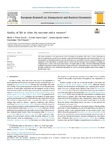Quality of life in cities: An outcome and a resource?

Use este enlace para citar
http://hdl.handle.net/2183/40541
Excepto si se señala otra cosa, la licencia del ítem se describe como Atribución-NoComercial-SinDerivadas 4.0 Internacional
Colecciones
- Investigación (FEE) [923]
Metadatos
Mostrar el registro completo del ítemTítulo
Quality of life in cities: An outcome and a resource?Autor(es)
Fecha
2025Cita bibliográfica
Pazos-García, M.J., López-López, V., Iglesias-Antelo, S. & Vila-Vázquez, G. (2025). Quality of life in cities: An outcome and a resource? European Research on Management and Business Economics, 31, 100264. https://doi.org/10.1016/j.iedeen.2024.100264
Resumen
[Abstract]: This study contributes to the improvement of the knowledge about quality of life (QoL) in cities, deepening not
only in its antecedents, but also in its outcomes, under the theoretical approach of the resource-based view. On
the one hand, we hypothesize that QoL in a city can be driven by governance resources such as transparency and
reputation; on the other hand, we propose that QoL can be seen as a strategic resource leading to a higher city
competitiveness, which in turn can act as an inducer of a higher smart city index. The latter relationship could be
explained as a positive resource spiral in cities, relying on resource conservation theory. Our study also provides
favorable evidence for these theoretical relationships set out in a structural equation model with a sample of
Spanish Smart cities.
Palabras clave
Governance
Quality of life
Competitiveness
Smart city
Quality of life
Competitiveness
Smart city
Versión del editor
Derechos
Atribución-NoComercial-SinDerivadas 4.0 Internacional
ISSN
2444-8834






